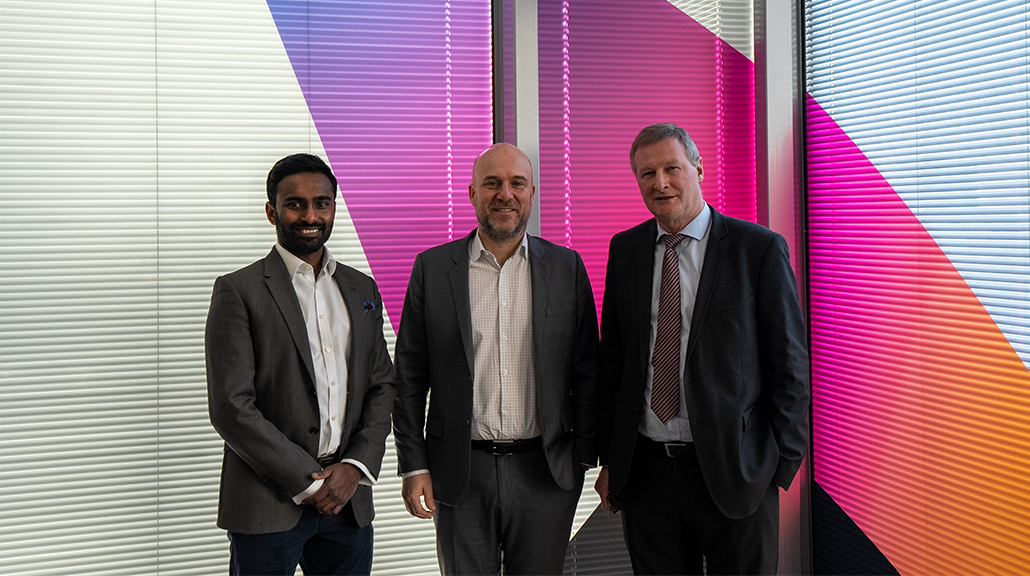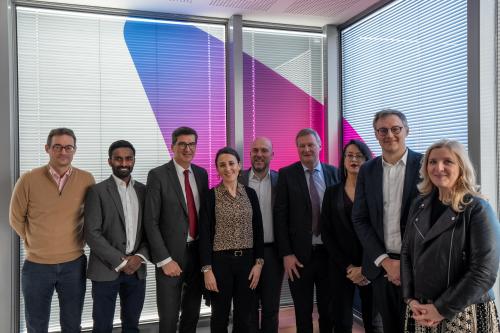Press Releases
Business travel: easyJet has successfully trialled a new model of corporate SAF solution with Airbus
Published February 04, 2025

- easyJet and Airbus designed a new business travel solution that aims to stimulate global Sustainable Aviation Fuel (SAF) production.
- The proof-of-concept trial explored and demonstrated how airlines and corporate organisations can share the cost of SAF in a mutually beneficial way, creating additional demand and supply for SAF.
- The resulting reduction in emissions from SAF usage is counted towards scope 3 reporting for corporate partners, along with easyJet’s scope 1 reporting.
- As part of the trial SAF was delivered to Toulouse-Blagnac Airport and for the equivalent to operating easyJet’s Toulouse-Bristol / Bristol- Toulouse service on 30% SAF for three months. easyJet intends other corporate travel partners to join the initiative.
easyJet and Airbus have successfully trialled a new model of corporate partnership to help business travellers address their carbon footprint and stimulate global SAF production.
SAF is expected to be a critical lever in decarbonising the aviation sector, offering an estimated 80% reduction in carbon lifecycle emissions on average compared to conventional jet fuel.
However, with the current production rate of SAF standing at just 3% of the total fuel required for the industry and costing 3-5 times more than conventional jet fuel, there are significant barriers the industry needs to overcome before it can make a significant impact.
This solution explores corporate partnerships as a way to help finance additional SAF, stimulate supply for future requirements and drive down the ‘green premium’ to make it more affordable.
Using corporate travel investment to scale up SAF production.
Through the model, easyJet’s corporate travel partners – starting with Airbus initially – can purchase a specific amount of SAF to address the carbon footprint from their corporate air travel, and simultaneously help to stimulate growth of the SAF industry. During a 3 months trial - November to January - SAFs certificates validate the use of SAF enabling corporate partners to claim the resulting emission reductions. To support the trial, 106 tonnes of neat SAF has been purchased, equivalent to the amount of fuel needed to operate easyJet’s flights between Toulouse and Bristol with 30% SAF blend, over a three-months period. The route has been chosen as it is commonly used by Airbus employees to fly between the HQ and Filton facility. The SAF purchased is produced from biomass feedstock, such as used cooking oil, and converted into jet fuel.
How the model works between easyJet and Airbus, and other corporate partners in the future:
- easyJet pools demand/ buys SAF – easyJet works with the corporate partner to determine a specific quantity of SAF to cover travel requirements. easyJet purchases the SAF from a fuel supplier.
- SAF is delivered to the airport – SAF is delivered to the designated easyJet operated airport by the fuel supplier (WFS for this trial).
- Corporate partners receive SAF certificate(s) – easyJet’s corporate partners are issued non-tradeable SAF certificates, verified by a third party (e.g. Verifavia). The corporate partner is then able to register the SAF certificate(s) as part of their scope 3 reporting.
easyJet intends to welcome other corporate travel partners to join the scheme. Both Airbus and easyJet expect this to act as a catalyst to drive up demand for SAF supplies around the world.
The project represents yet another historic collaboration between easyJet and Airbus, each sharing the ambition to trial new innovations to help lower the environmental impact of aviation.

“Business travellers make up around 14 percent of our customer base across our network and 20% on average in France, relying on airlines to travel efficiently. Our corporate partners are looking for ways to reduce the impact of their flying and many have set their own net zero targets. This solution will help them reduce their emissions and meet these targets while stimulating growth of the SAF industry, which will be critical to achieving the industry’s net zero ambitions. It is also important for us at easyJet to have a well-rounded approach to sustainability across our network, including French regions.”Lahiru Ranasinghe, easyJet Director of Sustainability
“Today, SAF is available in small quantities, so we need to upscale the supply and close the price gap with traditional fuel. One of the ways to do that is to create a clear demand signal for the market. In 2024, one megatonne of SAF was produced around the world and every single drop of that was consumed. This trial was about building a resilient SAF economy because we have the technology, we have the aircraft, we just need more SAF.”
Julien Manhes, Airbus Head of Sustainable Aviation Fuels and Carbon Dioxide Removal
"Toulouse-Blagnac Airport (ATB), a signatory of the Sustainable Aviation Fuels initiative in Occitanie region, is committed to supporting its partners in integrating sustainable aviation fuel (SAF) into their operations. In this perspective, ATB, in conjunction with the platform's Energeticians, has developed a SAF certificate process to provide airlines with proof of sustainability in compliance with European regulations. The airport is delighted to have ensured the supply in 2024 of 1350 m3 of ‘SAF 30%’ and aims to strengthen the logistical flow of its operations to exceed the target of the 2025 European mandates."
Alain de la Meslière, Toulouse-Blagnac airport Operations Director
Notes to editors: Airbus is the exclusive partner in this trial phase and easyJet is in advanced discussions with other corporate travel partners about joining the scheme.
Currently all Airbus aircraft are capable of flying with up to 50% Sustainable Aviation Fuel. The manufacturer is targeting to have its aircraft up to 100% SAF capable by 2030.
